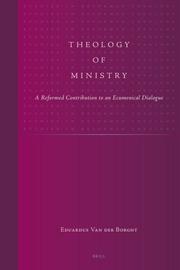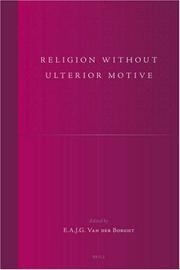| Listing 1 - 6 of 6 |
Sort by
|

ISSN: 15714799 ISBN: 1281926396 9786611926397 9047420772 9789047420774 9789004158054 9004158057 9781281926395 6611926399 Year: 2007 Volume: v.15 Publisher: Leiden Boston Brill
Abstract | Keywords | Export | Availability | Bookmark
 Loading...
Loading...Choose an application
- Reference Manager
- EndNote
- RefWorks (Direct export to RefWorks)
Theology of ministry has always been a controversial issue in the relation between churches, especially with its juridical approach that concentrated on authority. In recent decades the secularization and individualization in the Western world have intensified the challenge to reformulate the mission of the church and its ministries. Building on the Reformed theology of the 16th century (Zwingli, Calvin and confessions) and on the results of the ecumenical convergence on ministry (BEM) in the 20th century, this study presents building blocks for a renewed theology of ministry in the 21st century.
Reformed Church --- Clergy --- Ministry and Christian union. --- Clergy. --- Office. --- Baptism, Eucharist, and ministry. --- Christian union and ministry --- Christian ministry --- Ecclesiastical office --- Holy orders --- Ministry --- Office, Ecclesiastical --- Sacred ministry --- Taufe, Eucharistie und Amt --- Lima-Text --- WCC Lima text --- BEM --- Lima-Erklärung über Taufe, Eucharistie und Amt --- Lima document --- Lima-Erklärungen --- Lima-Dokument --- Lima-Konvergenzerklärungen --- Lima-Texte --- Battesimo, Eucaristia, ministero --- Baptême, eucharistie, ministère --- Christian union --- Pastoral theology --- Office --- Kirchliches Amt. --- Pfarrer. --- Reformierte Kirche. --- Reformierte Theologie. --- Lima-Erklärung. --- Geschichte 1500-1600 --- Clergy - Office. --- Reformed Church - Clergy. --- Ministry and Christian union --- 261.8*37 --- 261.8*37 Oecumenische theologie: ambt --- Oecumenische theologie: ambt

ISBN: 128145799X 9786611457990 9047411579 9789047411574 9004155090 9789004155091 9789004155091 9004155090 Year: 2006 Publisher: Leiden Boston, MA Brill
Abstract | Keywords | Export | Availability | Bookmark
 Loading...
Loading...Choose an application
- Reference Manager
- EndNote
- RefWorks (Direct export to RefWorks)
The awareness of the potential for abuse of religion has risen dramatically in the West since 9/11. We all seem to agree that the abuse of religion should be averted, and condemnation of the abuse of religion is almost universal. Bram van de Beek, systematic theologian at Vrije Universiteit Amsterdam, has radicalised this discourse by claiming that religion should not be allied to any cause, not even to a good cause. He illustrates this by the way theology has been instrumentalized within the Reformed tradition in e.g. apologetic theology, liberation theology, theocraty, and pietism. His thesis provokes fervent discussions. Twelve prominent theologians react on issues such as public theology, evangelical activism, Christian life, the relevance of reasons for faith, the unity of the church, and contextualization of religion in various parts of the world. At stake is the assertion that precisely religion without ulterior motive is the best guarantee for relevant religion.
Dissertation
Year: 2000 Publisher: Delft : Meinema,
Abstract | Keywords | Export | Availability | Bookmark
 Loading...
Loading...Choose an application
- Reference Manager
- EndNote
- RefWorks (Direct export to RefWorks)
Book
ISBN: 1282601547 9786612601545 9047442547 9789047442547 9789004158061 9004158065 Year: 2008 Publisher: Leiden Boston Brill
Abstract | Keywords | Export | Availability | Bookmark
 Loading...
Loading...Choose an application
- Reference Manager
- EndNote
- RefWorks (Direct export to RefWorks)
In this age of globalization, a need for a communicative explanation of personal and group positions also motivates Christians to describe more precisely their identity in relation to other actors in society. What makes a Christian a Christian? What is specifically Christian in social acions or political calling? Is there a difference between Christian justice and justice in general – and the way Christians deal with justice? What is our calling as Christians? The contributions in this volume are the result of the 6th biannual IRTI conference in Seoul 2005 on this theme.
Book
ISBN: 1282951149 9786612951145 9047443985 9789004179684 9004179682 9789047443988 9781282951143 6612951141 Year: 2010 Publisher: Leiden Boston Brill
Abstract | Keywords | Export | Availability | Bookmark
 Loading...
Loading...Choose an application
- Reference Manager
- EndNote
- RefWorks (Direct export to RefWorks)
In contrast to its original name, Ecclesia Reformata, ecclesiology did not develop into a major theme within the Reformed tradition. Notwithstanding the undeniable schismatic tendency and the ecclesial embarrassment about disunity, the unity of the church did not rise to prominence as a theological topic. This volume challenges this traditional low-key attitude towards the unity of the church. It investigates theological aspects that contributed to a weak sensus unitatis, and explores approaches that remedy the disease of division. It discusses the role played by scripture, the sacraments, confessions, and discipline; it searches for the best theological practices within other Christian traditions; it links the unity of the church to the unity of God and reformulates the nature of the church.
Reformed Church --- Church --- Doctrines --- Unity
Book
ISBN: 1282948709 9786612948701 9004193634 9789004193635 9781282948709 6612948701 9789004158078 9004158073 Year: 2010 Publisher: Leiden Boston Brill
Abstract | Keywords | Export | Availability | Bookmark
 Loading...
Loading...Choose an application
- Reference Manager
- EndNote
- RefWorks (Direct export to RefWorks)
The idea of freedom of religion was developed in Europe in the 16th and 17th century in the context of religious diversity as an alternative for religious wars. The concept requires reconsideration in the current globalized culture: religious plurality has increased as has the awareness of the religious potential for social cohesion and for sectarian division and violence. In this volume, legal experts, sociologists, theologians, and philosophers clarify the historical development of the concept, and analyze the present situation in various countries with religious tensions. They propose possible models and solutions, and discuss the fundamental question of whether the Western model of human rights with its separation of religion and state and freedom of religion can be conceived as universal.
Freedom of religion. --- Religious pluralism. --- Human rights.
| Listing 1 - 6 of 6 |
Sort by
|

 Search
Search Feedback
Feedback About UniCat
About UniCat  Help
Help News
News